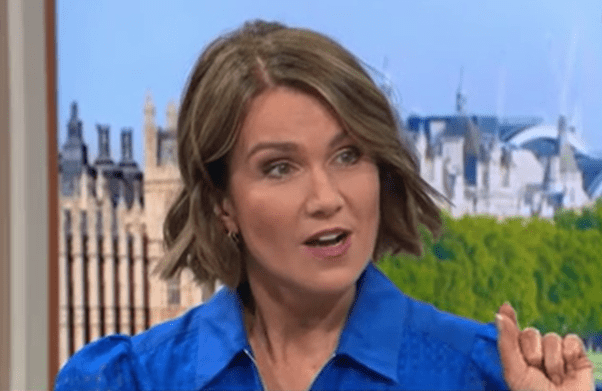has said her incurable condition was triggered on air during .
The 53-year-old TV presenter , a condition that causes sounds like ringing or buzzing in one, or both, ears or in a person’s head.
The , and while there are things that may help like deep breathing and cutting down on caffeine (according to the NHS), the
Susanna first revealed she suffered from tinnitus in 2015, saying she started hearing the noises ten years before and it left her ‘distressed’ that she would ‘never hear silence again’.
During Wednesday’s Good Morning Britain, she revealed she had suffered with it for many years, and after a sound demonstrating what it was like played on air, her condition was triggered.
The host spoke to , who also suffers from the condition, and is raising awareness of it.


‘That is very similar to what I have in my ears, but at the top of it, is a very high pitched sound,’ she said, comparing it to a ‘whistle’.
She went on: ‘Mine I feel is quite low-level, and I was saying earlier to the viewers, my advice is to tune out of it.’
Hearing it on air, she added: ‘It’s really interesting, the ringing sound we played just now, that triggered it now in my ears.
‘Now I can hear it again, because you have to make a conscious effort to tune it out, so actually reminding myself of it…
‘But it’s fine, I just think I’m not going to worry about it, I’ll just end up tuning it out again.’
What is tinnitus?
According to the NHS, tinnitus is the name for hearing noises that don’t come from an outside source.
People who suffer with the condition can hear sounds like ringing, humming, hissing, music or singing in one or both ears, on in their head.
The sounds could be constant or come and go, and though it is incurable, there are things to do to help you cope, like avoiding stress or loud background noises, finding ways to improve sleep and ways to relax.
GPs or specialists can refer people with the condition to types of talking therapy or counselling to help.
Explaining what it was like for him, Jamie, who began suffering from tinnitus eight years ago, said has is learning to accept it.
He woke up one morning to realise the ringing sound he had suddenly heard was coming from inside his head, and now compares it to hearing air conditioning on in the background.
‘You have to tune out of it, you have to realise it’s not harmful,’ he shared despite admitting it’s ‘incredibly debilitating’ and has caused him anxiety ‘that makes it worse’.
‘When it first started and you realise it’s not going to go, [I was] incredibly anxious. I thought I was never going to sleep again,’ he said.
‘I thought I was never going to be able to hear again, and it was so loud, I couldn’t hear people talking to me at one point. It was that bad.’

He now sees it as his ‘annoying best friend’ that lets him know when he’s tired or stressed and he needs to relax.
‘But some people have had something like meningitis and woken up deaf, and all they can hear is tinnitus, but people who have tinnitus like you and I, everyday noise can block it out occasionally but if you’re deaf you just have ringing, it’s horrendous.’
Susanna added that after hearing the sound for the first time, she quickly went to the doctors, who told her there was no cure but that she could ‘talk herself out of it’.
She for help and support and stressed that despite there being no cure, there are ‘numerous therapies that help’ and that could ‘make it less of a problem’.
Good Morning Britain airs weekdays from 6am on ITV1.




















